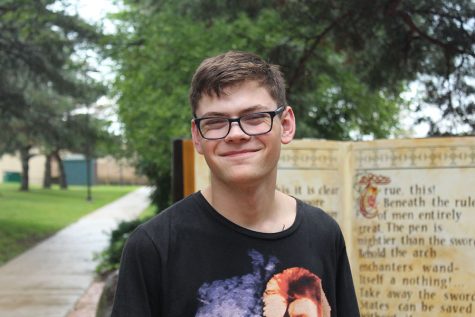The other side of AP culture at West
Senior Harry Westergaard discusses the toll West’s academic environment can take on students, and how to improve it.

May 10, 2019
As students at West finish various AP tests this week, I’d like to take a minute to address the impact that these tests, and the AP culture on the whole, has on students at the school. At West, the AP classes that students may take over the course of the school year seek to give an accelerated curriculum to students who wish to get more out of their education. These classes explore the subjects more in-depth at a faster rate, perhaps trying to simulate the college experience as best as they can in high school. But the true goal is to prepare for the AP test at the end of the year.
Now I definitely see the appeal of these classes. I’ve taken a couple myself in fact. Sure, some students want a little bit more from their education. They want that extra headway that the AP test might give them in college if they get a high score. Maybe a little hint at what college classes could entail in terms of work. Understandable. That being said, the students and faculty at West High greatly overestimate the importance of these classes and it leads to toxicity in the environment at the school. A mentality where these classes are the only path to success pervades throughout the building and makes it harder for students to learn at their own speed. As somebody who has nontraditional learning methods, the push of the AP classes has especially affected my learning in my last year at West.
It’s not the classes themselves that foster this way of thinking, but rather the fervor that the school and students create around them. Other students in my grade will talk at length about all of the AP classes they’re taking and their grades in said classes. They will spend whole class periods studying for other AP classes and perhaps lament the fact that they got a B instead of an A on something. The end result is that the school can feel like a competition. And it shouldn’t feel like that, because in a competition, everybody plays by the same rules to reach the same common goal, and in the end, somebody wins and another loses. Education isn’t that singular. Different people move at different speeds to meet their own individual goals. The rules shouldn’t be the same for everybody, because it’s ultimately about what works for the individual student. AP classes don’t work for every student. It’s that competition mindset that undercuts the actual education.
The roots of the problem start with the administration. Counselors often will pressure students who have no interest in AP classes, to try and take an AP class. The main purpose here is to get as many students as possible to take the classes so that they can have an even larger percentage than they already do. More students will get lumped into this large number that members of the administration can then boast about at various events at the beginning of the year. “X amount of students at West are in AP classes.” This can then lead to another boastful number, the high number of students at West who have “at least passed” the test.
I believe that parents also have a hand in this. A lot of parents in the community treat education like a little league sports game, where they cheer on their kids and push them past the limit in order to beat other students. Now, this isn’t the case for every student, but it’s definitely a mindset that’s prevalent in this community, a byproduct of the current age of helicopter parenting.
There’s also the problem of events like the Senior Recognition Ceremony. The event strives for inclusivity (the administration encourages every senior to fill out a form) but ultimately caters to very specific groups, namely the athletes and those who have a 4.0 GPA. Okay, a celebration of these things is in order. It’s not bad to have these achievements. But does everyone in the senior class really have to sit through this whole ceremony? Can’t people hold these celebrations on their own? Isn’t graduation itself the time to celebrate all of the achievements of everyone in our senior class? Or individual grad parties? The list goes on.
Okay, time to back up a bit. I’ve addressed in detail the problems that I believe plague the school’s academic culture from my perspective. Now I’d like to get constructive so this isn’t just Harry Yelling at Thin Air in the Corner on His Soapbox. So what’s the solution? First of all: No, I am not calling for the removal of all AP classes at West High. I’d like to stress once again for the people in the back that I am not against the idea of AP classes themselves. We have some great teachers and great curriculums here at West that fall under that category. Rather, I’d like to offer up ways that West can downplay the hype surrounding such classes.
I say get rid of the recognition ceremony. Students are allowed to be proud of their achievements but the senior recognition ceremony showcases a very narrow idea of success after high school. People with high grades and scholarships for college are given their time to shine while everyone else sits in the audience and claps at the people who are viewed as successful by traditional measures. Why do we need this extra event to pat these students on the back? The graduation ceremony serves this purpose and recognizes everybody. I’m not saying that we give out “participation trophies” for everyone. But having time set aside for this event is a bit much.
Secondly, I think that teachers and counselors should make less of a push for students to take these classes. It needs to be emphasized that you can take them and should if you’re interested in the subject in question. But it also needs to be said that if you aren’t taking them, then it’s okay. You aren’t “dumb” or “inferior.” It’s possible to be in an AP class for one subject and a standard class for another. Too many people in the school are thinking about how the students can contribute to this percentage than about what works best for the student in question.
Graduation is a major milestone in our lives. It’s the time when people are going different directions and making rough outlines for what their future will entail. Not everyone’s outline is going to be the same and that’s okay. We need to celebrate this reality instead of judging people for their decisions. What works for you might not work for the other person. Individuality is what makes people exciting and interesting to associate with. As our class goes into the world, we can’t forget that.




